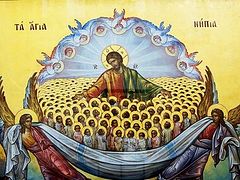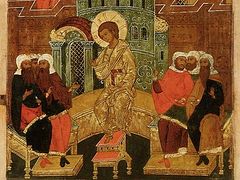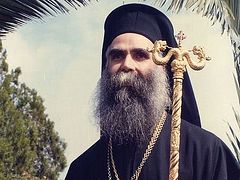The Reading from the Holy Gospel according to St. Matthew. (2:13-23)
One of my professors in seminary would always say that when you read the holy gospels, or when you listen to the words of the Lord Jesus Christ, you should always think of yourself as one of the people that Christ is correcting. Why would he say that? He was trying to teach us how to read the gospels with humility. After all, what can we take from the teaching of the Lord if we feel that somehow we are already keeping all of His teachings? The benefit to us is quite small if we come to the Lord and believe that we are already righteous, but the benefit is infinitely great if we see ourselves as the ones in dire need of His healing touch.
As we are continuing to celebrate the feast of the birth of our Lord and Savior Jesus Christ we hear this gospel passage from Matthew 2, and it could be really easy for us to look at the situation and immediately judge the characters put before us. The main antagonist in this gospel passage and in the stories relating to the birth of Christ is Herod. We know this because he was hunting for the baby Jesus in the angels words “to destroy Him.” Herod’s madness of course went much further because he did not stop at hunting down the infant Jesus, he also killed every male child under the age of two, in the whole region of Bethlehem, to the tune of 14,000 babies in all. He was a truly a barbaric, beastly man.
But it is not enough to simply see him as an evil man and to move on. We are well served to see ourselves as not much better than this man. Everyone is capable of great evil. Everyone who has not been purified in their heart is carrying terrible thoughts and desires although we may not act on them. But the Lord tells us that the one who has the thoughts, has committed the sins in the place where it matters, that is the heart.
So how might we be like this mad tyrant Herod? We are like him because we do not give the Lord time to grow in our hearts. He comes to us each day, as an infant, as a little voice, a brief thought. But what do we do with that thought? We usually cast it out of our minds and hearts just as quickly as we can. Since the Lord comes to us in a gentle and humble way, like an infant, it is so easy for us to cast Him aside in our day to day lives. Sometimes we go further than casting Him aside, we actually destroy the remembrance of Him through our unrepentant life of sin. St. Paul speaks of this when he writes“Forit isimpossible for those who were once enlightened, and have tasted of the heavenly gift, and were made partakers of the Holy Ghost, And have tasted the good word of God, and the powers of the world to come, If they shall fall away, to renew them again unto repentance; seeing they crucify to themselves the Son of God afresh, and put himto an open shame” Heb 6:4-6.
From this we understand that each one of us has the potential to be just as bad as Herod, and even worse because unlike Herod, we have all tasted of the grace of God and been enlightened by the Holy Spirit and yet we sometimes choose to fall away without aiming to repent and return. Our hearts can turn cold just as Herod had an icy cold heart. What is the solution to this terrible problem? How can we keep from stumbling and falling as did Herod?
First, we have to honor the voice of the Lord in the little day to day things. If we do not honor the still, soft voice of God when He comes to us gently, how will we honor Him when He comes as king and judge over all creation? So we honor Him by honoring His commandments and His teachings and by honoring His words to each of us. When we honor the small, we receive the greater. When we read the gospels every day with more eagerness than we give to football games and video games and social media and novels and news reports, we then show ourselves to be worthy recipients of God’s Son. It is like we are welcoming Him into our home instead of chasing Him out of our minds and into a foreign place (which is Egypt). Herod was not a worthy recipient of the news of the birth of the one born king, and because he did not accept the news with joy, he lost the opportunity to be saved through this amazing gift. But his failure did not end there.
We can also keep from stumbling like Herod by acknowledging that there can only be one king and His name is Jesus Christ, the name which is above all others. We are required to do what Herod in his pride and arrogance would not do. We are called to fall on our knees and submit with gratitude to the Son of God and His lordship over our lives. Am I ready to acknowledge that Jesus Christ is the master and I am the servant or slave of God? Or am I like Herod, simply unable and unwilling to accept that anyone should have lordship over me and my life?
Herod thought of his life, his position and his status as his own. He was in delusion. This is the delusion of sin which leads to death. He thought of his status and position and life as things that should be protected at all costs, even the murder of tens of thousands of innocent children, even the attempted murder of the new born messiah. Are we also in delusion? Do we think of our life as our own? How could we possibly think that our life was our own? You did not give yourself life. Life was breathed into you by the One to whom you owe your very existence. The One who gave us life also bought us at a price and redeemed our lives from sin and death. For this we ought to be eternally thankful and joyful and in this joy we must not walk but run to embrace Jesus Christ with our very lives. Run to Him! Grow in Him! Become one with Him!
If we take this seriously we will not be found lacking like the tyrant Herod but will find our real strength and treasure and life in the life of Christ our Lord, to Him alone is due all glory, with His Father and the Holy Spirit AMEN.





